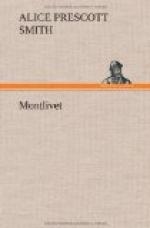“But the master is sick. I go with him.”
“You stay here.”
“I go with the master.”
“I will not allow it.”
“Then I follow behind.”
“You have no canoe, no provision.”
“I have legs. I can walk. I can eat tripe de roche.”
The giant was trembling. I could not but respect this rebellion. He had broken the chains of three centuries in his defiance. The thought of his filling his cavernous stomach with tripe de roche—which is a rock lichen, slimy and tasteless—moved me somewhat.
“You dare disobey me, Pierre?”
“But the master is sick.”
I shrugged, but the logic held. “Then tell the chief,” I capitulated. “And see that I have something to wear.”
Water was brought by one squaw, and another fetched more broth and bound my shoulder with fresh dressings. Then leggings, robe, and girdle of wolfskin were left for me. I put them on with difficulty, and went to find Outchipouac.
I stepped out into a glare of sunshine and stood blinking. The braves were gathered in a group, and a line of squaws barred me from them. I started toward them, but the squaws waved me back; they pointed me to the shore and the waiting canoe. Pierre rolled forward, uneasy and scowling.
“The braves will not speak to us; they say our talk means nothing.”
“Who said that?”
“Outchipouac. He showed me a grass ring hanging on a pole by his lodge. He says that when you come again and hang a silver one in its place it will be time for him to listen.”
I knew the Indians were watching, though covertly, so I could only bow. I went to the canoe and looked to its provisioning. There were two bags of rice, one of jerked meat, some ears of maize, and the dried rind of a squash; a knife and a hatchet lay with them. Our hosts had been generous. We were to be aided even if we were to be disciplined. I found my place, and Pierre took the paddle and pushed away.
It is one thing to be at enmity with savages, it is another to be an outcast among them. I knew that their attitude had excuse, and I was sick with myself. Then my Indian dress chafed my pride. I was sure that Pierre was laughing under his wrinkled red skin, and I was childish enough to be ready to rate him if he showed so much as a pucker of an eye. For I had always refused to let my men adopt the slightest particular of the savage dress. I had held—and I contend rightly—that a man must resist the wilderness most when he loves it most, and that he is in danger when he forgets the least point of his dress or manner. After that the downward plunge is swift. I had said this many times, and I knew Pierre must be recalling it.
And so I was sore with fate. Wounded, skin-clad, I was not heroic in look; it was hard to be heroic in mind. I had jeopardized the chance of an empire for a woman. But that proved nothing. The weakest could do that. It must be shown that I could justify my sacrifice.




